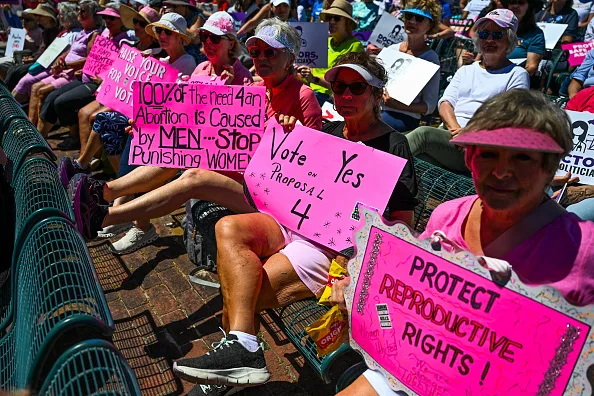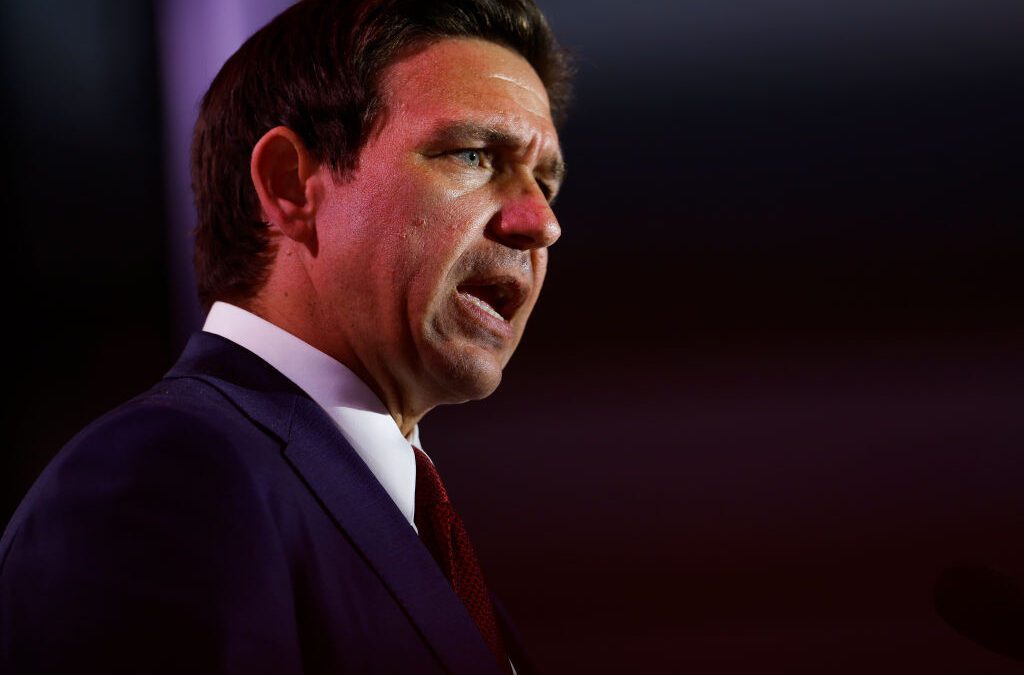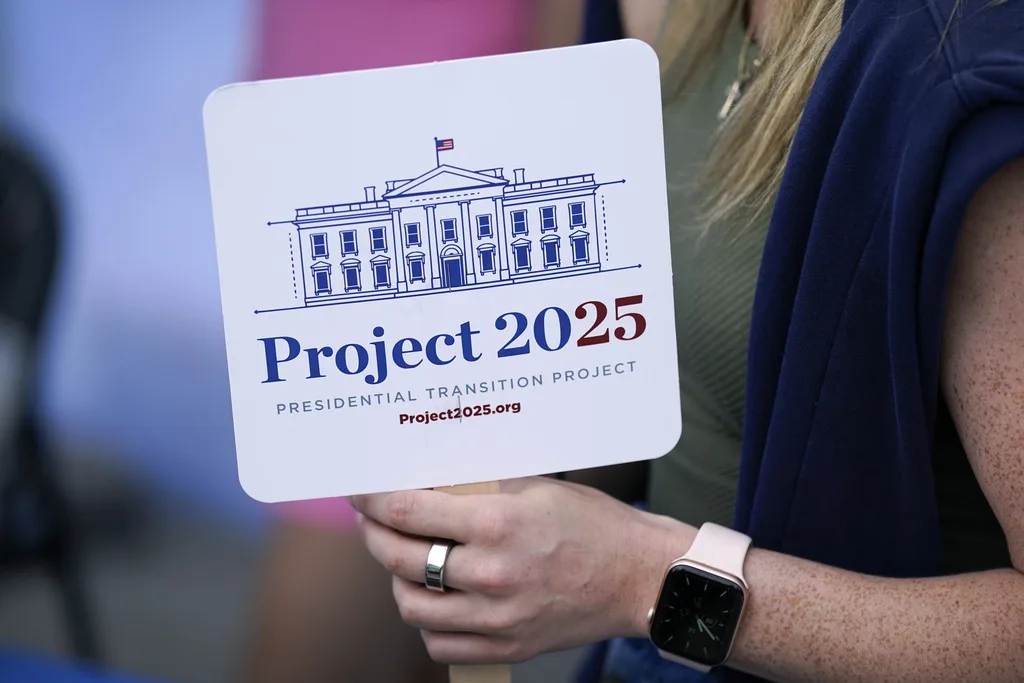
Photo by CHANDAN KHANNA/AFP via Getty Images
Florida voters will decide in November whether they want a 6-week abortion ban or to protect abortion rights until 24 weeks of pregnancy.
As Floridians rallied in Orlando Saturday to kick off the Yes on 4 campaign–a push to enshrine the right to abortion in Florida’s Constitution via a ballot measure–anti-abortion groups Liberty Counsel and Susan B. Anthony Pro-Life America are preparing to fight the passage of Amendment 4.
The proposed amendment would protect abortion rights up to viability, which is generally understood to mean when a baby can survive outside the womb, which the medical community puts at about 24 weeks.
If the measure were to pass, it would amend the state constitution to include language stating that “No law shall prohibit, penalize, delay, or restrict abortion before viability or when necessary to protect the patient’s health, as determined by the patient’s healthcare provider.”
Florida currently has a 15-week abortion ban, with a 6-week ban taking effect May 1 with exceptions for fatal fetal abnormalities and to protect the life of the mother. Victims of rape, incest, and human trafficking are allowed to get abortions up to 15 weeks if they provide evidence, such as a restraining order, a police report, or medical records.
RELATED: Inside Rick Scott’s ‘toxic record on abortion’
But a six-week ban, reproductive rights advocates say, would effectively ban most abortions in the state, as many women aren’t aware they’re pregnant by six weeks.
“This is going to affect the health of tens of thousands of women. We are going to see a rise in maternal mortality rates,” Debbie Mucarsel-Powell, the former Democratic Florida Congresswoman who is running to unseat Rick Scott in November, told Floricua during a one-on-one interview.
Where the ballot measure stands
In order to pass in November’s election, Amendment 4 needs 60% of voters to vote yes. The changes would then go into effect in January.
Recent surveys suggest the measure has a reasonable chance of meeting the 60% threshold. According to an Emerson College survey of 1,000 registered voters conducted April 9-10:
- 42% of Florida voters plan to cast their ballots in favor of the constitutional amendment that would enshrine the right to abortion up until fetal viability.
- 32% percent of voters are undecided, while 25% will vote against the amendment.
- 57% percent of respondents said Gov. DeSantis’ 6-week abortion ban is too strict, while 28% said it’s about right, and 15% said it’s not strict enough.
- 56% of Democrats and 44% of Independents plan to vote for the measure.
- 30% of Republicans are planning to vote in favor, 36% are planning to oppose it, and 34% said they’re unsure.
The poll has a margin of error +/- 3 percentage points.
Anti-abortion groups plot to defeat the measure
Even if the amendment passes, however, anti-abortion groups are preparing to challenge the results.
Mat Staver, the founder of the anti-abortion group Liberty Counsel, told Politico that if voters approve the abortion rights initiative, “there is a prime lawsuit waiting to take it up to the Florida Supreme Court.”
According to Staver, the April 1 Florida Supreme Court opinion opened the door for anti-abortion groups to use a personhood argument to challenge the ballot measure, since a provision in the Declaration of Rights, found in the state Constitution, guarantees rights for “all natural persons.” Three of the seven justices wrote in the April 1 opinion that the court has yet to decide if fetuses are included.
Susan B. Anthony Pro-Life America, one of the largest anti-abortion groups in the country, is separately working to defeat the measure before it passes. Kelsey Pritchard, director of state affairs for the group, told Politico that because the initiative requiring 60% of the vote to pass, “they’re going to find it difficult to achieve that level of support in the red state of Florida where Gov. DeSantis won by a landslide in 2022 and the majority of residents support the heartbeat protection.”
While polling data contradicts Pritchard’s claim of majority support for DeSantis 6-week ban, reaching 60% will be no easy feat for the Yes on 4 campaign.
How a 6-week ban would affect Florida women and families
If the amendment fails to pass—or if anti-abortion groups succeed in challenging it after the fact—Gov. Ron DeSantis’ 6-week ban would have devastating impacts on women in Florida.
The ban will impact mainly low-income women, including women of color. Florida is home to 1.4 million Latinas of reproductive age, and of this population 558,000 are economically insecure.
“Marginalized women will be most affected, and any woman that suffers an unfortunate medical situation or miscarriage or any other number of medical conditions that could put their life at risk or the baby’s life at risk,” Alejandra Rondon told Floricua last year as she co-led floridalibertad.com, the Spanish language arm of the Floridians Protecting Freedom campaign to place abortion rights on the 2024 ballot in Florida.
Lucia Báez-Geller, a member of the Miami-Dade School Board who is running as a Democrat to represent Florida’s 27th Congressional District, knows all too well the importance of keeping abortion legal.
In a recent Miami Herald editorial, Báez-Geller shared that one year ago, her doctor informed her that her pregnancy wasn’t viable. The news came at 10 weeks — four weeks past the new six-week ban that will go into effect in Florida on May 1.
“My doctor gave me three options: I could have a D&C, which my doctor described as the safest, most effective option; I could be given a medication abortion pill, which my doctor described as potentially extremely painful; or, lastly, I could allow my body to go through a natural miscarriage,” Báez-Geller wrote. “After this new abortion ban goes into effect, women in Florida won’t have three options. They will be forced into the unsafe third option.”
As painful and private as this event was, Báez-Geller told Floricua that she felt the responsibility “to speak up for those who have gone through a similar situation, and to let women know that they are not alone.”
“Every pregnancy is unique, and that is why it is imperative that these decisions stay between a woman, her doctor and her faith,” she said in a recent interview.
RELATED: Debbie Mucarsel-Powell: ‘Fundamental freedoms are at stake’
Politics

DeSantis ‘will not comply’ with rules to protect transgender students
"Refusing to comply with Title IX could have damaging consequences for schools, including significant loss in funding on the order of hundreds of...



Housing market cools along Florida’s Gulf Coast
The uptick in the construction of new housing followed the influx of newcomers to Florida during the pandemic, but that boom is now tapering off....
Local News



DeSantis ‘will not comply’ with rules to protect transgender students
"Refusing to comply with Title IX could have damaging consequences for schools, including significant loss in funding on the order of hundreds of...



Housing market cools along Florida’s Gulf Coast
The uptick in the construction of new housing followed the influx of newcomers to Florida during the pandemic, but that boom is now tapering off....





